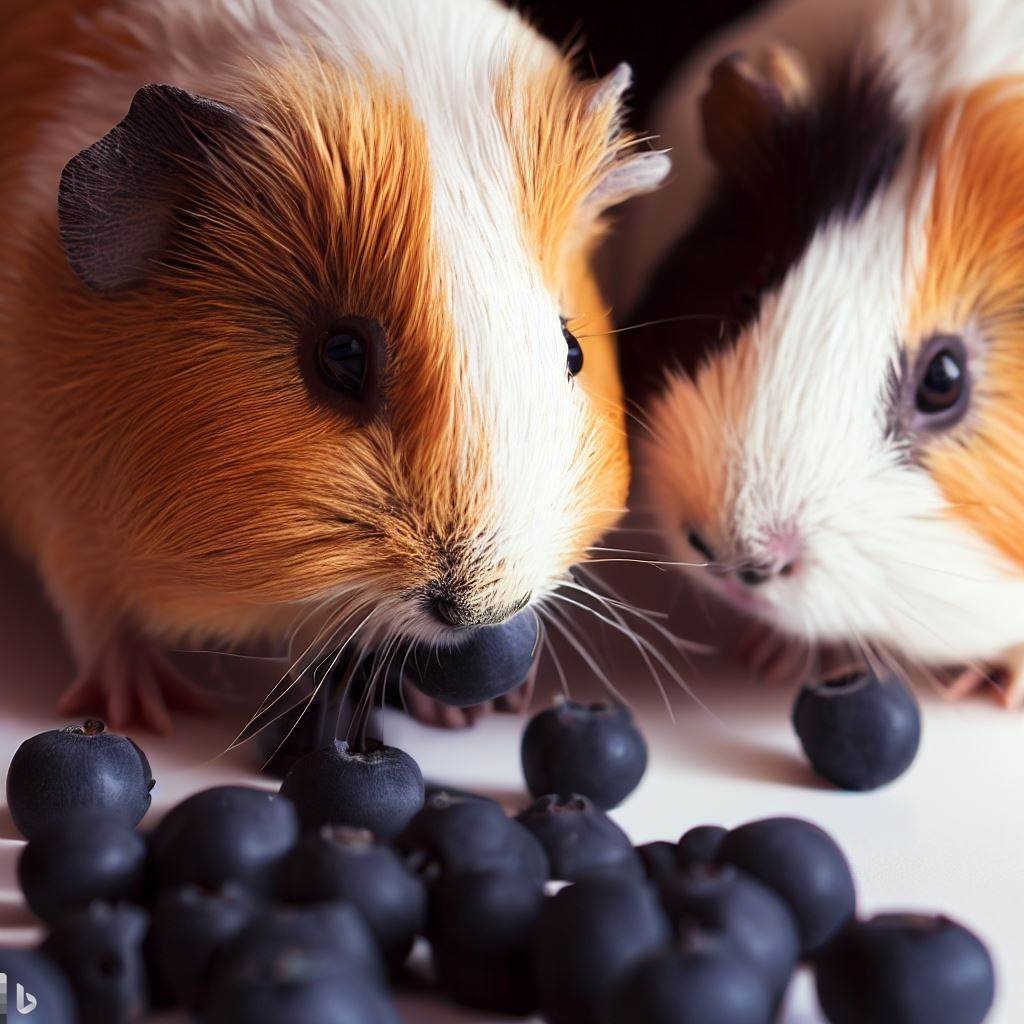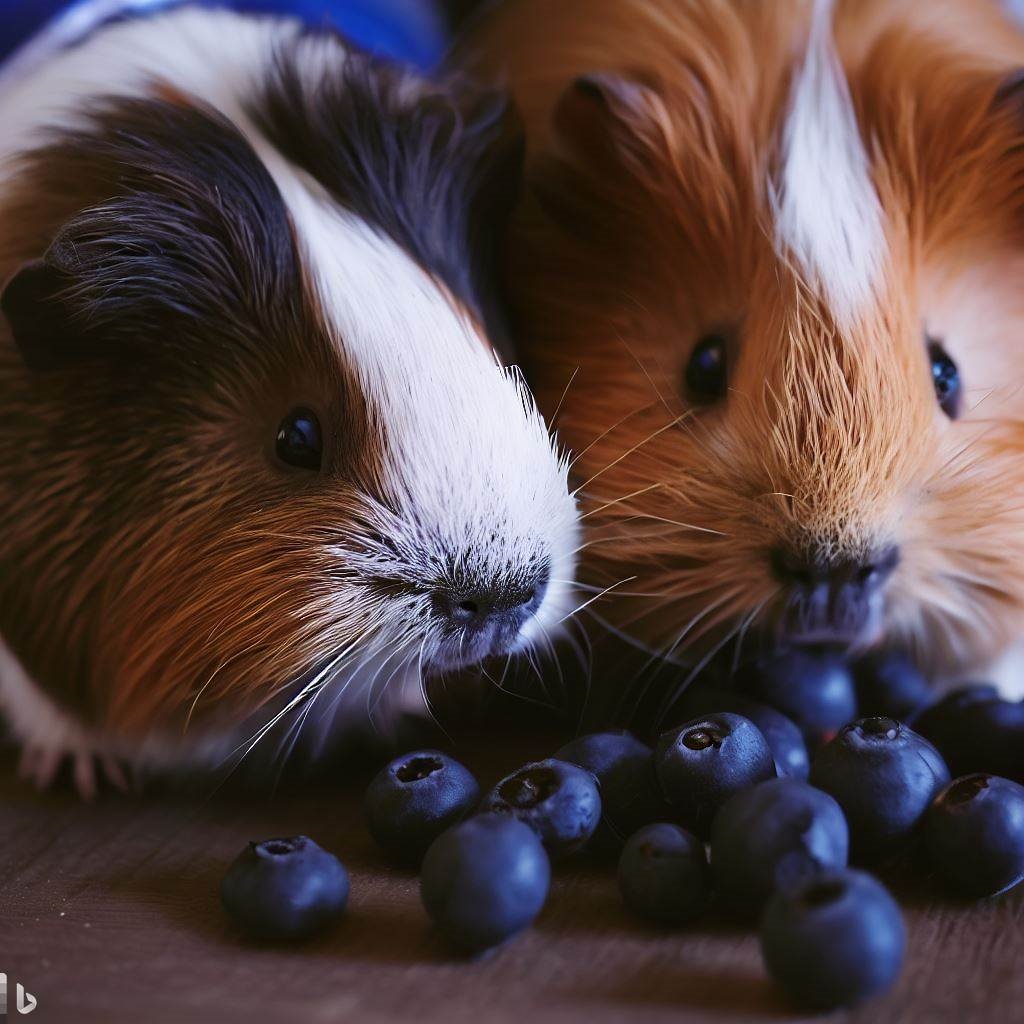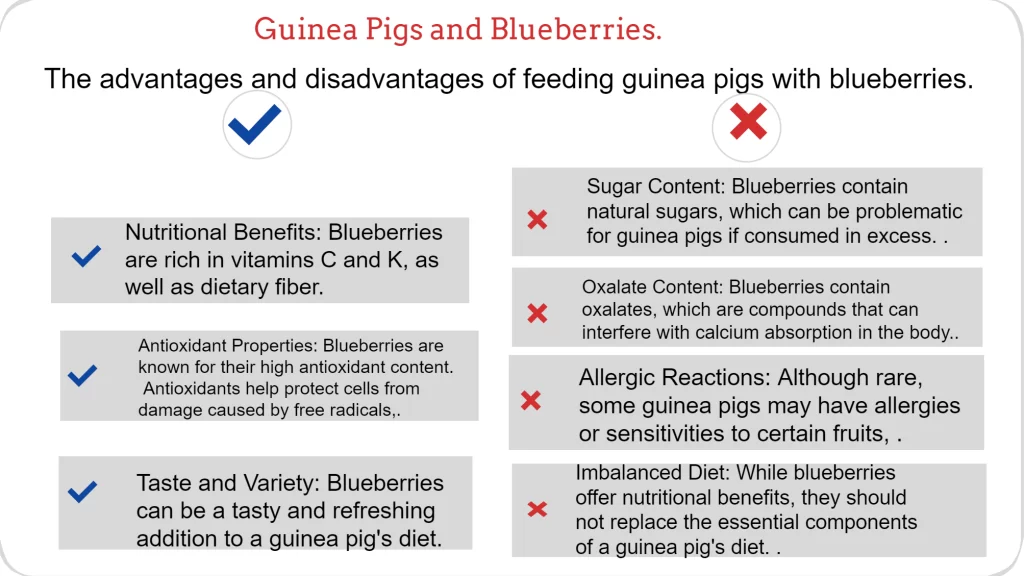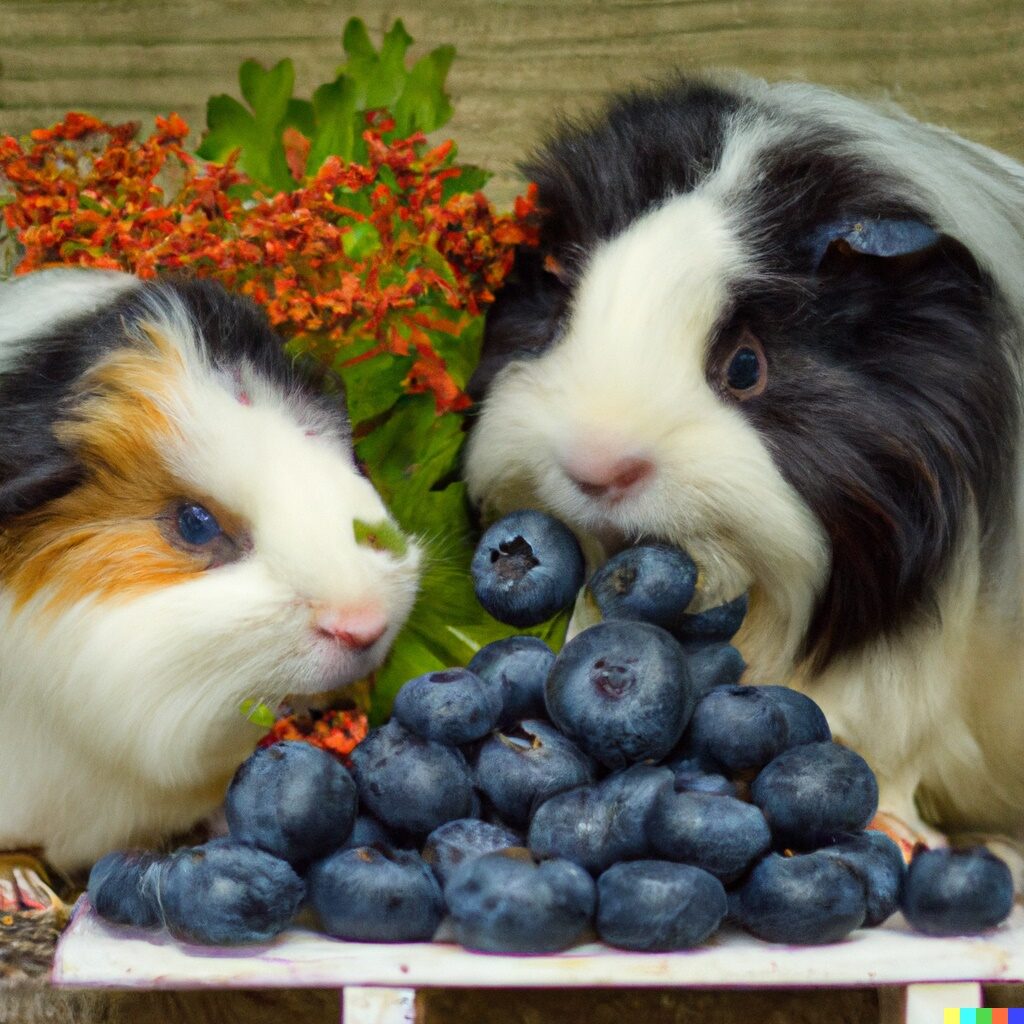The answer to the issue of whether guinea pigs can eat blueberries is yes, guinea pigs can eat blueberries. Blueberries are typically safe to feed to guinea pigs in moderation. They may be a nutritious and delightful supplement to their diet.
Guinea pigs have special nutritional needs, and their primary diet should include high-quality hay, fresh vegetables, and guinea pig pellets. They supply them with the fiber, vitamins, and minerals they require for good health. Little quantities of fruits, such as blueberries, can, nevertheless, provide some extra nutritional advantages. Also want to know whether guinea pigs can eat cabbage?
Blueberries have a high antioxidant content, which can be good to guinea pigs. Antioxidants protect cells from free radical damage, which is generated by unstable molecules that can lead to a variety of health problems. Guinea pigs may benefit from the antioxidant advantages of blueberries by incorporating them in their diet.
It’s important to note that while blueberries are generally safe, moderation is key. Blueberries contain natural sugars, and excessive sugar consumption can lead to health problems for guinea pigs, including weight gain, digestive issues, and dental problems. Therefore, it’s crucial to provide blueberries as a treat and not as a primary food source.
It’s best to ease a guinea pig onto blueberries by feeding it a modest amount at first. Start off by giving your guinea pig one or two blueberries and seeing how it reacts. Not all guinea pigs share the same enthusiasm for the flavor. If your guinea pig seems to appreciate blueberries and has no sensitivities to them, you can give them a couple every once in a while, as a treat.

Keep in mind that guinea pigs need more than just blueberries in their diet. They also need hay, pellets, and fresh veggies. These foods should always make up the bulk of their diet. Feeding your guinea pig a healthy diet that includes blueberries and other fruits and vegetables is essential.
If you notice any unusual behavior, signs of allergies, or digestive issues after introducing blueberries, it’s important to consult a veterinarian. They can provide guidance and ensure the well-being of your guinea pig.
Feeding and risk of providing blueberries to guinea pigs.
Some broad recommendations on how much, how often, and at what risk to provide blueberries to guinea pigs. If you want to provide your guinea pig the finest possible care, it’s smart to check in with a vet. Take into account the following:
Serving Sizes:
Blueberries should be considered a treat and not a staple food in a guinea pig’s diet. The serving size for blueberries should be small due to their high sugar content. A reasonable serving size would be one or two blueberries per serving.
Frequency:
Blueberries should be given to guinea pigs only occasionally, as a special treat. It is recommended to offer blueberries no more than once or twice a week to avoid overfeeding and ensure a balanced diet.

Risks and Considerations.
High sugar content:
Blueberries contain natural sugars, so it’s important to limit the amount given to guinea pigs. Excessive sugar intake can lead to weight gain, digestive issues, and potential dental problems.
Diarrhea:
Some guinea pigs may be more sensitive to new foods, including blueberries. Introduce them gradually and observe your guinea pig for any signs of digestive upset or diarrhea. If any adverse reactions occur, discontinue feeding blueberries and consult a veterinarian.
Choking hazard:
Blueberries are relatively small, but it’s still important to cut them into small, manageable pieces to reduce the risk of choking or gastrointestinal blockage. Avoid giving whole blueberries to guinea pigs.
You may also read: Can guinea pig bloat go away on it’s own?

What are the advantages and disadvantages of feeding guinea pigs with blueberries.
Advantages of Feeding Guinea Pigs Blueberries:
- Nutritional Benefits: Blueberries are rich in vitamins C and K, as well as dietary fiber. Including blueberries in your guinea pig’s diet can contribute to their overall nutritional intake and support their health.
- Antioxidant Properties: Blueberries are known for their high antioxidant content. Antioxidants help protect cells from damage caused by free radicals, potentially reducing the risk of certain diseases and promoting overall well-being.
- Taste and Variety: Blueberries can be a tasty and refreshing addition to a guinea pig’s diet. Introducing different flavors and textures can add variety to their meals and make feeding time more enjoyable.
Disadvantages of Feeding Guinea Pigs Blueberries:
- Sugar Content: Blueberries contain natural sugars, which can be problematic for guinea pigs if consumed in excess. High sugar intake can lead to weight gain, digestive issues, and dental problems in guinea pigs. Therefore, moderation is crucial when offering blueberries as a treat.
- Oxalate Content: Blueberries contain oxalates, which are compounds that can interfere with calcium absorption in the body. Excessive oxalate consumption may contribute to the formation of bladder or kidney stones in some guinea pigs. However, the oxalate levels in blueberries are generally considered low and not a significant concern.
- Allergic Reactions: Although rare, some guinea pigs may have allergies or sensitivities to certain fruits, including blueberries. Signs of an allergic reaction can include itching, rashes, difficulty breathing, or digestive issues. If you notice any adverse symptoms after feeding blueberries, consult a veterinarian.
- Imbalanced Diet: While blueberries offer nutritional benefits, they should not replace the essential components of a guinea pig’s diet. Guinea pigs require a diet primarily consisting of high-quality hay, fresh vegetables, and guinea pig pellets to meet their specific nutritional needs. Blueberries should be considered as an occasional treat and not the main source of nutrition.
To ensure a balanced and healthy diet for your guinea pig, it is important to offer a variety of vegetables, fruits, and other suitable treats in addition to blueberries. Consulting a veterinarian or a guinea pig specialist can provide further guidance on the appropriate portion sizes and frequency of offering blueberries to your pet.
FAQS.
What fruit can guinea pigs eat daily?
Guinea pigs are herbivores, so they can eat a variety of fruits every day. They especially love apples and bananas, but other safe fruits include blueberries, strawberries, grapes, melons and mangoes. Just be sure to avoid citrus fruits like oranges or lemons as these could upset their stomachs!
What’s the best fruit for guinea pigs?
The best fruit for guinea pigs are apples, pears and bananas. These fruits offer essential vitamins and minerals as well as providing a healthy source of sugar to boost their energy levels. Additionally, they can provide roughage from the skin which aids digestion. However, it’s important to ensure that the portion size is kept small so that your guinea pig doesn’t get an upset tummy!
What can guinea pigs eat unlimited?
Guinea pigs can eat unlimited hay, fresh vegetables and water. Hay should make up the majority of their diet as it provides essential fibre which helps keep their digestive system healthy. Fresh vegetables such as carrots, parsley and celery are also important sources of vitamins and minerals for guinea pigs. Make sure to provide a variety of different types of veggies so they get all the nutrients that they need. Water should be available at all times in either a bottle or bowl – just remember to change it daily!
Do guinea pigs need to eat all day?
Guinea pigs have a relatively high metabolism, so they need to eat small amounts of food throughout the day. They should be provided with a constant supply of fresh hay, vegetables and pellets. Additionally, guinea pigs need vitamin C supplements in their diet as they are unable to produce it naturally like other animals can. It’s important that you provide your guinea pig with proper nutrition and enough food during the day to keep them healthy and happy.
What food makes guinea pigs happy?
Guinea pigs are omnivores, so they enjoy a diet of fresh hay and vegetables as well as small amounts of fruit. They also like to eat high-quality guinea pig food that is specifically made for them. These pellets should be supplemented with plenty of dark leafy greens, such as kale and spinach, as well as root vegetables like carrots or sweet potatoes. Treats such as oats or Timothy hay can also make your piggie happy!











